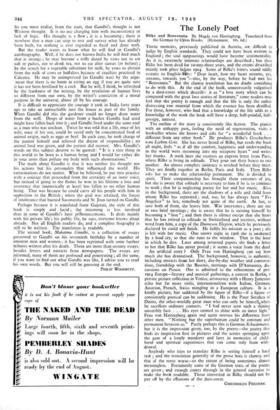The Lonely Poet
Rilke and Benvenuta. By Magda von Hattingberg. Translated from the German by Cyrus Brooks. (Heinemann. 10s. 6d.)
THESE memoirs, previously published in Austria, arc difficult to judge by English standards. They could not have been written in England ; the soul ompourings would have become sentimentality. As it is, extremely intimate relationships are described ; but then Rilke has been dead for twenty-three years, and the events described mainly took place be re1914. Some of Rilke's letters sound oddly ecstatic to English : " Dear heart, how my heart streams, yes, streams, towards you"—this, by the way, before he had met his " Benvenuta." But the clumsy translation has no doubt something to do with this. At the end of the bodk, unnecessarily vulgarised by a dust-cover which describe it as " a love story which can be compared with the great love stories of literature," some readers may feel that the poetry is enough and that the life is only the rather distressing raw material from which the essence has been distilled. For those, however, who find that a knowledge of the life adds to a knowledge of the work the book will have a deep, half-painful, half- gossipy, interest.
The outline of the story is consistently like fiction. The pianist with an unhappy past,. feeling the need of regeneration, visits a bookseller whom she knows and asks for " a wonderful book . . . different from any other book." He produces Rilke's Geschichten vom Lieber Gott. She has never heard of Rilke, but reads the book all night, feels " as if all the comfort, happiness and understanding in the world were streaming into my receptive heart " and write,. her thanks. A week later she receives an express letter from Paris, where Rilke is living in solitude. They pour out their hearts to one another. An almost complete intimacy is reached before they meet. They arc finally together in Berlin, Paris and Italy. Then Rilke asks her to make the relationship permanent. She is divided in spirit. Their companionship has brought them extremes of joy, but she is aware that solitude is necessary to him if he is to continue to work ; that he is neglecting poetry for her and her music. Also, in the background, there are the shadows of a wife and child from whom Rilkc has separated ; and, too, he has always been " Fri Angelico" to her, somebody not quite of the earth. At last, to save both of them, she leaves him. War intervenes ; there are one or two brief meetings ; she is aware that he is ruining himself by becoming a " lion " ; and then there is silence except that she hears that he has retired to solitude in Switzerland and receives, without word from him, a copy of the Duinesen Elegies, which he previously declared he could not finish. He fulfils his mission as a poet ; she is left with her music. One snowy night in 1926 she is awakened by a loud cry, so that she runs to the window. That is the hour in which he dies. Later among returned papers she finds a letter to her that Rilke has never posted ; it seems a voice from the dead.
An artificial story ? Only Frau von Hattingberg can say how much she has dramatised. The background, however, is authentic, including extracts from her diary, day-by-day weather and conversa- tions, friendship with the Busonis, meetings with D'Annunzio, dis- cussions on Proust. One is admitted to the refinements of pre- 1914 Europe—literary and musical gatherings, a concert in Berlin, a private picture collection in Venice, aristocracy with a Henry jamesian echo but far more virile, internationalism with Italian, German, Austrian, French, Swiss mingling in a European culture. It is a kindly picture, but saddened by the figure of Rilke—if a figure sa consistently poetical can be saddening. He is the Pater Serafico of Duino, the other-worldly great man who can only be himself.when he sacrifices ordinary contacts. " I had never seen such a shining unearthly face. . . . His eyes seemed to shine with an inner light." Frau von Hattingberg again and again stresses his difference from other men. "Nothing but the superhuman could be constant and permanent between us." Partly perhaps this is German Schwiirmerei, but it is the impression given, too, by the poetry—the poetry that finds its inspiration first in pictures and the scenes springing upon the gaze of a lonely wanderer and later in memories of child- hood and spiritual experiences that can come only from with- drawal.
Anybody who tries to translate Rilke is setting himself a hard
task ; and the translation generally of the prose here is clumsy and that of the verse worse—to the extent of being sometimes almost meaningless. Fortunately some of the German texts of the poems are given; and enough comes through in the general narrative to make the• book readable. Those interested in Rilke should not be
put off by the effusions of the dust-cover.
GWENDOLEN FREEMAN.


































 Previous page
Previous page